In their own words: ED caregivers explain why they stayed, what kept them strong, during pandemic
Qua’Shandra Stewart, respiratory therapist
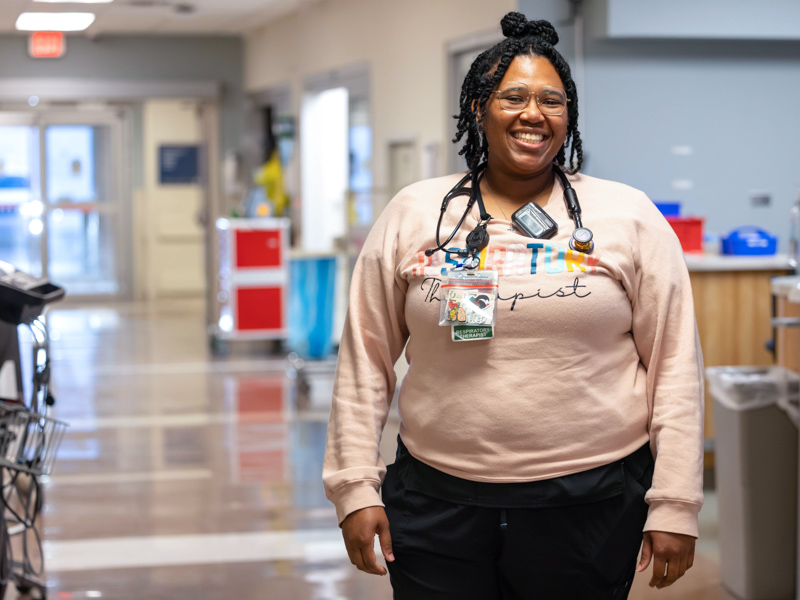
When she wondered if she could push through one more day of trying to save COVID-19 patients, Qua’Shandra Stewart turned to her higher power.
“Prayer was the reason I stayed,” said Stewart, a respiratory therapist. “I would get off work and call my pastor. I would get on my knees. He would tell me to keep on praying, and God will give you your answer.”
And, she got her answer. “It was always, put on your armor. You have to be a light for your people,” Stewart said.
Never could Stewart, a respiratory therapist for a decade, imagine herself in the middle of a pandemic that robbed so many victims of their ability to breathe. “When it first started, we were on the fence on whether it was really bad,” she said.
Then, Stewart said, “we got knee deep.” They didn’t know what they didn’t know about the highly contagious virus that was quickly felling patients.
“I love what I do and love helping people, but when you get to the point where they’re asking you to help them and you can’t help them, it takes your mental health to another place,” she said.
Even then, even as she feared passing on the virus to her then-3-year-old daughter, “I always tried to go in their room with a smile. It didn’t matter how much energy it took from me.”
She was the light.
“They can’t catch their breath,” Stewart remembered. “I’m just as anxious as they are. I told myself that I have to stay calm to help them be calm.
“Just holding their hand, trying to let them know that I will be there with them when their family cannot so that they can have a little peace of mind … Sometimes, I don’t have the words to describe what it felt like.”
Today, she said, “I go to work with a smile on my face, even if it’s in the midst of a horrible wreck or a fire. It doesn’t overwhelm me. If we got through a pandemic, we can pray and stick together as a team.
“We can do anything.”
— — —
Dr. Emily Tarver, assistant professor of emergency medicine
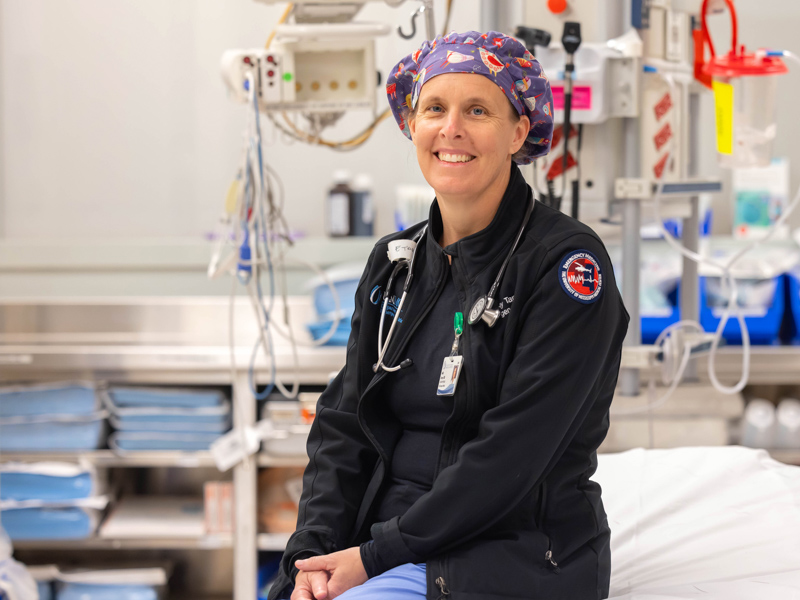
As she worked the 11 p.m.-7 a.m. ED shift in the darkest days of the pandemic, Dr. Emily Tarver asked herself: Am I up to this task? Is this the right place for me?
“The thing about COVID is that there was always a different or new curveball. We always had to be ready to pivot,” said Tarver, an assistant professor in the Department of Emergency Medicine and one of four Adult ED physician nocturnists. “Even during the first months of the pandemic and when we were in lockdown, trauma numbers went way up, and we’re still trying to figure that out.”
Tarver did what emergency medicine providers do best: Treat all comers, no matter how sick or injured. “It wasn’t about should I stay or should I go. It was, ‘How do we best get through this?’”
Her biggest test was the Delta surge. “It was an awful crash that reminded us that this would be with us for a while.
“The pregnant patients … These beautiful women who came in who were so sick with COVID. I’ll never forget one who was on a ventilator, full term. It was hard to see that and know she might never hold her baby.
“You want so much not to put them on a vent, because you know what that means,” Tarver said. “She didn’t make it. That was my hardest case.”
The mom of four boys said that’s when you lean on your team. “We had a period from late 2020 through the middle of 2021 when these amazing people were leaving. I understood and wasn’t angry. I accepted it, but I missed them and I needed them there.”
She’s changed over the pandemic.
“I fall back on education,” said Tarver, whose other passions include remote learning technology research in the School of Medicine’s Simulation Center. “For me, education is sometimes therapeutic, and definitely in the SIM lab.
“I have more faith. Every shift, I do the best I can.”
— — —
Hilton Rahaim, Emergency Department technician
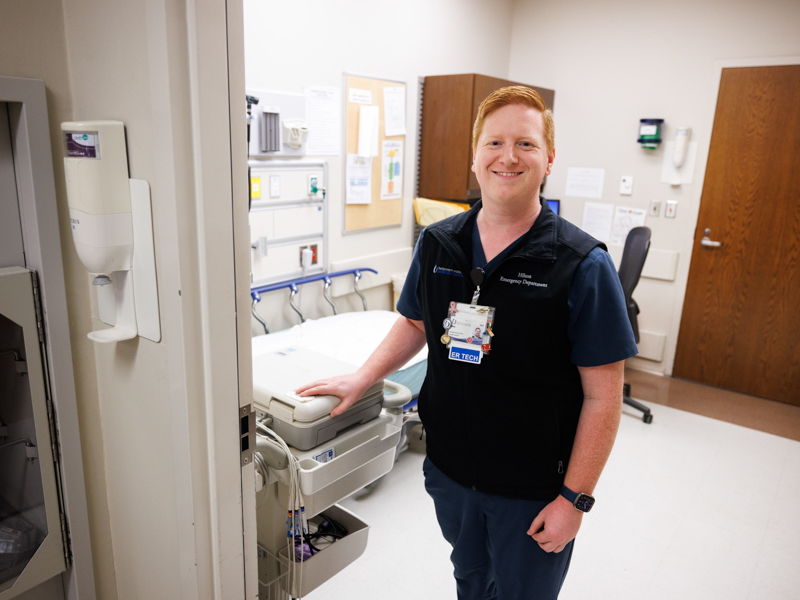
Hilton Rahaim remembers when the COVID-19 pandemic “got really bad, really quick.”
He’s an Adult ED technician, a true frontliner who gets patients’ vital signs and glucose levels and performs many other medical tasks during triage before placing them in an exam room as they become available.
“As the months progressed, we had more and more patients coming in. Then all of a sudden … most everyone was on a ventilator. We had patients lined throughout the halls. Our waiting room was completely full that August (2021),” Rahaim said.
“All the patients were very sick, and going downhill very quickly. I would leave work one day, and go in the next day and they’d say, X number of patients passed away yesterday. That was just for the short period I was gone.”
It was mentally exhausting, emotionally exhausting, “and in some cases, it felt defeating,” Rahaim said. “It seemed like everything we were doing was not helping our patients.”
Even so, Rahaim said, there was never a time where he felt like he couldn’t walk back through the doors. “I didn’t think of it that way,” he said. “But there were days where I thought, ‘Are we ever going to move to the other side of this?’
“I always knew that there was a place I needed to be in order to help serve the citizens of Mississippi,” he said. “Truly, the sickest of the sick came through those doors and still do.”
Those who worked through the entire pandemic “are very close. We pulled ourselves up and gave each other positive vibes to keep each other motivated.
“We have bonded in a way that most other people have not,” Rahaim said. “Just lifting each other up was a huge way to boost morale.”
Rahaim learned that he and his coworkers can get through the most awful of days, maybe not with ease, but with each other.
“I feel like going through that era, that we can overcome pretty much anything,” he said.
— — —
Brandy Benton, emergency medicine registered nurse
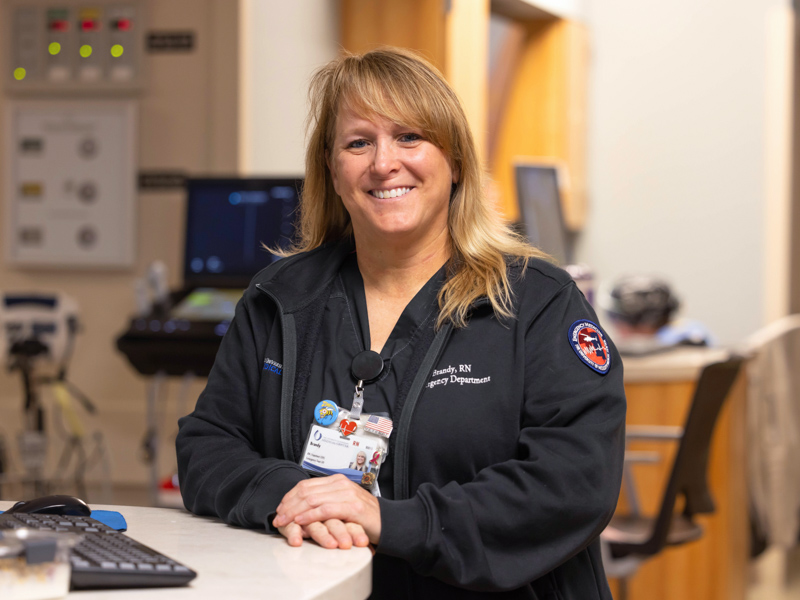
When Brandy Benton walked down the aisle April 26 to be recognized by Emergency Medicine leaders for her pandemic service, “I felt appreciated and proud to be working at such a wonderful institution,” she said.
One of 69 Adult ED front-line caregivers to receive a specially designed badge for service throughout the pandemic, the registered nurse and Air Force veteran understands the power of that patch.
The Mississippi native served as a staff sergeant/firefighter while stationed in Arizona. She deployed to Kuwait in 1999, then to Afghanistan shortly after the 9-11 attack. “I’ve seen the worst of the worst,” she said.
Benton began her tenure at UMMC as a tech in the ED in 2015 before going back to school to become a nurse. Benton said she stayed through the pandemic because UMMC is where she belongs.
“I don’t know that I could go anywhere else and feel the same fulfillment,” she said. “I trust everybody I work with. We lifted each other up.
“As bad as everything was, we knew we were in it together.”
Today, “there’s not as much uncertainty as there was before,” Benton said. “I do feel like we’re on the other side, and for now, it’s a huge sense of relief.”
— — —
Dr. Joshua Norman, assistant professor of emergency medicine
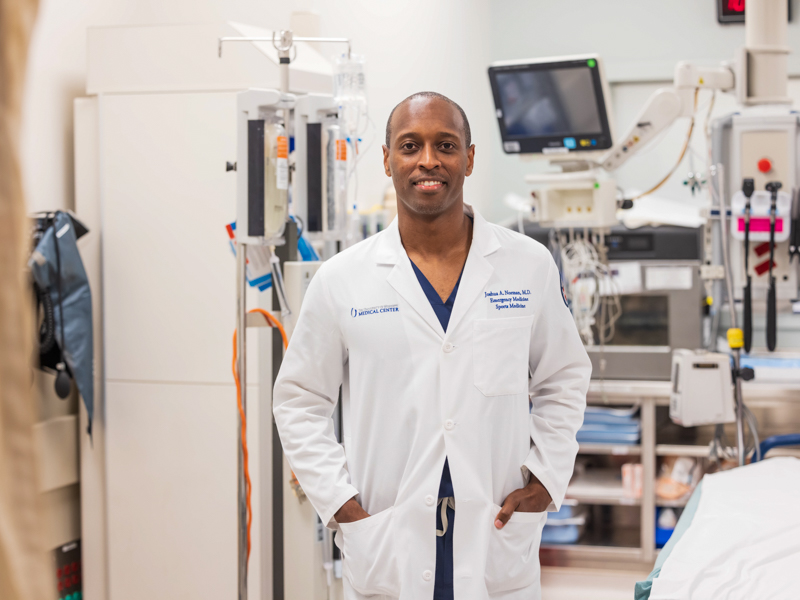
Like a number of caregivers in the Adult ED, Dr. Joshua Norman at first felt detached from the images of COVID-19 patients overwhelming hospitals in New York.
That changed quickly. “First and foremost, there was the fear of the unknown, for ourselves, for our patients and for our families,” said Norman, an assistant professor of emergency medicine. “I had a newborn at the time. I had no idea what the risks were to small children.”
As the pandemic roared into the ED, “seeing such high mortality and such sick patients ... there was a huge feeling of helplessness. There was no traction on what seemed to make a difference for anyone,” he said.
But, they hunkered down and faced the challenge, one patient at a time.
“As a team, we were able to come together,” Norman said. “I didn’t think about leaving, but I can’t blame someone who had those thoughts. It was such a time of loss.
“I felt if we didn’t care for these patients in the front lines, who would care for them? It felt like a sense of duty.”
His experiences have given him perspective above and beyond what you’d develop through the rigors of emergency medicine, Norman said. “In the moment you don’t realize how exhausted you were, but looking back, you see that it left a scar on everyone.”
The ceremony to recognize those who stayed “definitely moved me,” Norman said.
“I felt incredibly proud to be part of the team and UMMC. Especially in the ED, there is camaraderie and selflessness and commitment to patient care.”
Read how Adult Emergency Department caregivers were recognized for their work during the pandemic here.


